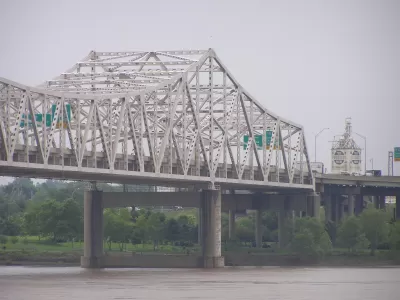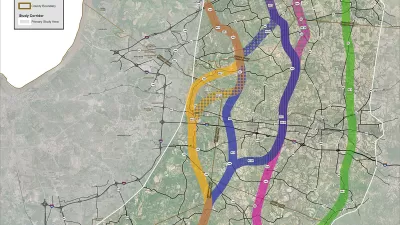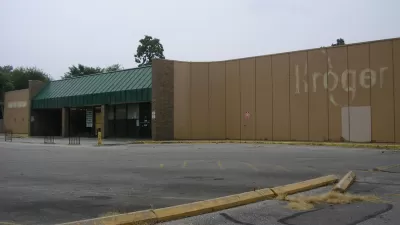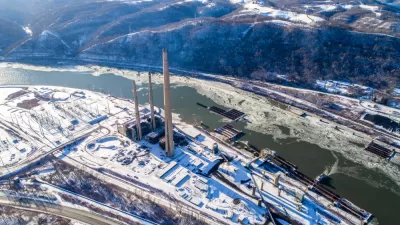Aaron Renn says the bridge projects in and near Louisville, Kentucky, were too expensive and have not led to any positive transportation or economic results.

In a piece on his blog, Aaron Renn writes about the Louisville-Southern Indiana Ohio River Bridges Project, which he says he was skeptical about back in 2007 when the proposal was first floated.
After taking a closer look at the traffic data, he says the outcome is even worse than he imaged. “The project has proven to be a money waster of the highest order, and in fact by far the biggest American transportation boondoggle I can identify in the 21st century so far,” says Renn.
The Interstate 65 bridge is a parallel span connecting Louisville, Kentucky, to Jefferson, Indiana, and it doubled the number of lanes across the river. The East End Crossing is a new bridge built up the river from downtown Louisville. The price tag for each bridge was $1.38 billion, and both crossings added tolls to help cover the project costs. The result, says Renn, is that traffic shifted to the two free bridges in the area, and the number of vehicles on the I-65 bridge dropped 50 percent between 2013 and 2018.
He also argues that expanding the crossing in downtown Louisville sliced up the area in detrimental ways. In addition, he points to data showing that truck traffic on the I-65 spans dropped by over 30 percent. “Where did they go? If you are a region that’s banking on the distribution industry for a big part of your future blue-collar employment growth, the tolls on these bridges can’t be good news. That’s particularly true when no surrounding competitor city has tolls.”
Renn says the bridge project made no sense, both from a transportation perspective and a fiscal one. And at a time when states claim funding for transportation projects is tight, pouring money into a project like this one, while better projects fall by the wayside, is problematic, he says. “This boondoggle didn’t happen by accident. It wasn’t a result of ignorance. It was well known in advance that it was a bad idea. It was a deliberate, conscious choice.”
FULL STORY: Louisville Bridges Project Is the Biggest Transportation Boondoggle of the 21st Century

Maui's Vacation Rental Debate Turns Ugly
Verbal attacks, misinformation campaigns and fistfights plague a high-stakes debate to convert thousands of vacation rentals into long-term housing.

Planetizen Federal Action Tracker
A weekly monitor of how Trump’s orders and actions are impacting planners and planning in America.

In Urban Planning, AI Prompting Could be the New Design Thinking
Creativity has long been key to great urban design. What if we see AI as our new creative partner?

King County Supportive Housing Program Offers Hope for Unhoused Residents
The county is taking a ‘Housing First’ approach that prioritizes getting people into housing, then offering wraparound supportive services.

Researchers Use AI to Get Clearer Picture of US Housing
Analysts are using artificial intelligence to supercharge their research by allowing them to comb through data faster. Though these AI tools can be error prone, they save time and housing researchers are optimistic about the future.

Making Shared Micromobility More Inclusive
Cities and shared mobility system operators can do more to include people with disabilities in planning and operations, per a new report.
Urban Design for Planners 1: Software Tools
This six-course series explores essential urban design concepts using open source software and equips planners with the tools they need to participate fully in the urban design process.
Planning for Universal Design
Learn the tools for implementing Universal Design in planning regulations.
planning NEXT
Appalachian Highlands Housing Partners
Mpact (founded as Rail~Volution)
City of Camden Redevelopment Agency
City of Astoria
City of Portland
City of Laramie





























